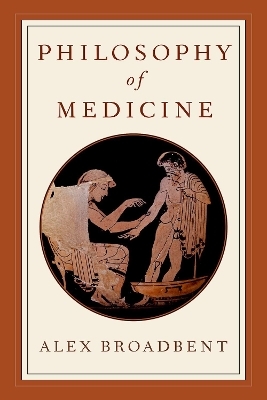
Philosophy of Medicine
Seiten
2019
Oxford University Press Inc (Verlag)
978-0-19-061213-9 (ISBN)
Oxford University Press Inc (Verlag)
978-0-19-061213-9 (ISBN)
Philosophy of Medicine provides a fresh and comprehensive treatment of the topic. It offers a novel theory of the nature of medicine, and proposes a new attitude to medicine, aimed at improving the quality of debates between medical traditions (including alternatives) and facilitating medicine's decolonization.
Philosophy of Medicine asks two central questions about medicine: what is it, and what should we think of it? Philosophy of medicine itself has evolved in response to developments in the philosophy of science, especially with regard to epistemology, positioning it to make contributions that are medically useful. This book locates these developments within a larger framework, suggesting that much philosophical thinking about medicine contributes to answering one or both of these two guiding questions.
Taking stock of philosophy of medicine's present place in the landscape and its potential to illuminate a wide range of areas, from public health to policy, Alex Broadbent introduces various key topics in the philosophy of medicine. The first part of the book argues for a novel view of the nature of medicine, arguing that medicine should be understood as an inquiry into the nature and causes of health and disease. Medicine excels at achieving understanding, but not at translating this understanding into cure, a frustration that has dogged the history of medicine and continues to the present day.
The second part of the book explores how we ought to consider medicine. Contemporary responses, such as evidence-based medicine and medical nihilism, tend to respond by fixing high standards of evidence. Broadbent rejects these approaches in favor of Medical Cosmopolitanism, or a rejection of epistemic relativism and pluralism about medicine that encourages conversations between medical traditions. From this standpoint, Broadbent opens the way to embracing alternative medicine.
An accessible and user-friendly guide, Philosophy of Medicine puts these different debates into perspective and identifies areas that demand further exploration.
Philosophy of Medicine asks two central questions about medicine: what is it, and what should we think of it? Philosophy of medicine itself has evolved in response to developments in the philosophy of science, especially with regard to epistemology, positioning it to make contributions that are medically useful. This book locates these developments within a larger framework, suggesting that much philosophical thinking about medicine contributes to answering one or both of these two guiding questions.
Taking stock of philosophy of medicine's present place in the landscape and its potential to illuminate a wide range of areas, from public health to policy, Alex Broadbent introduces various key topics in the philosophy of medicine. The first part of the book argues for a novel view of the nature of medicine, arguing that medicine should be understood as an inquiry into the nature and causes of health and disease. Medicine excels at achieving understanding, but not at translating this understanding into cure, a frustration that has dogged the history of medicine and continues to the present day.
The second part of the book explores how we ought to consider medicine. Contemporary responses, such as evidence-based medicine and medical nihilism, tend to respond by fixing high standards of evidence. Broadbent rejects these approaches in favor of Medical Cosmopolitanism, or a rejection of epistemic relativism and pluralism about medicine that encourages conversations between medical traditions. From this standpoint, Broadbent opens the way to embracing alternative medicine.
An accessible and user-friendly guide, Philosophy of Medicine puts these different debates into perspective and identifies areas that demand further exploration.
Alex Broadbent is Professor of Philosophy, Executive Dean of Humanities, and founding Director of the African Centre for Epistemology and Philosophy of Science at the University of Johannesburg. He has interests in philosophy of science, medicine, epidemiology, and law. This is his third book.
Introduction
Part A. What Is Medicine?
1. Varieties of Medicine
2. The Goal of Medicine
3. The Business of Medicine
4. Health and Disease
Part B. What Should We Think of Medicine?
5. Evidence-Based Medicine
6. Medical Nihilism
7. Medical Cosmopolitanism
8. Alternatives and Medical Dissidence
9. Decolonizing Medicine
| Erscheinungsdatum | 20.02.2019 |
|---|---|
| Verlagsort | New York |
| Sprache | englisch |
| Maße | 213 x 145 mm |
| Gewicht | 448 g |
| Themenwelt | Geisteswissenschaften ► Philosophie |
| Medizin / Pharmazie ► Allgemeines / Lexika | |
| Medizin / Pharmazie ► Medizinische Fachgebiete ► Medizinethik | |
| Studium ► Querschnittsbereiche ► Geschichte / Ethik der Medizin | |
| Naturwissenschaften | |
| ISBN-10 | 0-19-061213-4 / 0190612134 |
| ISBN-13 | 978-0-19-061213-9 / 9780190612139 |
| Zustand | Neuware |
| Haben Sie eine Frage zum Produkt? |
Mehr entdecken
aus dem Bereich
aus dem Bereich
Die Geschichte eines Weltzentrums der Medizin von 1710 bis zur …
Buch | Softcover (2021)
Lehmanns Media (Verlag)
CHF 27,90
Krankheitslehren, Irrwege, Behandlungsformen
Buch | Softcover (2024)
C.H.Beck (Verlag)
CHF 55,90


